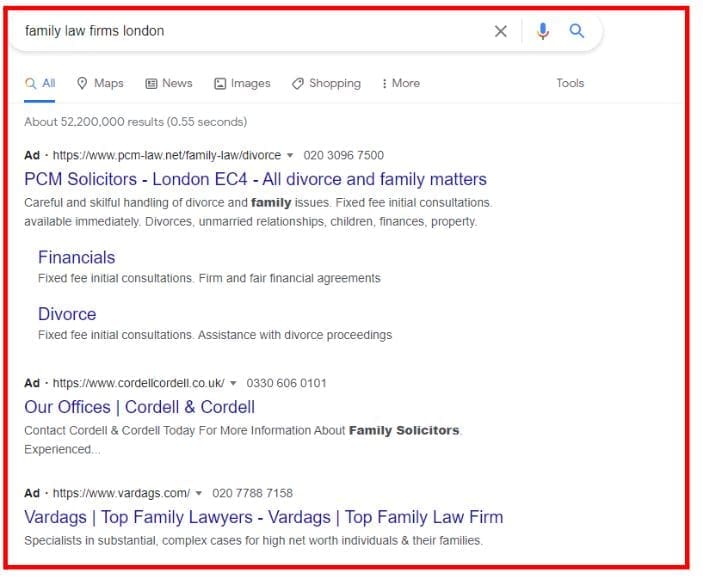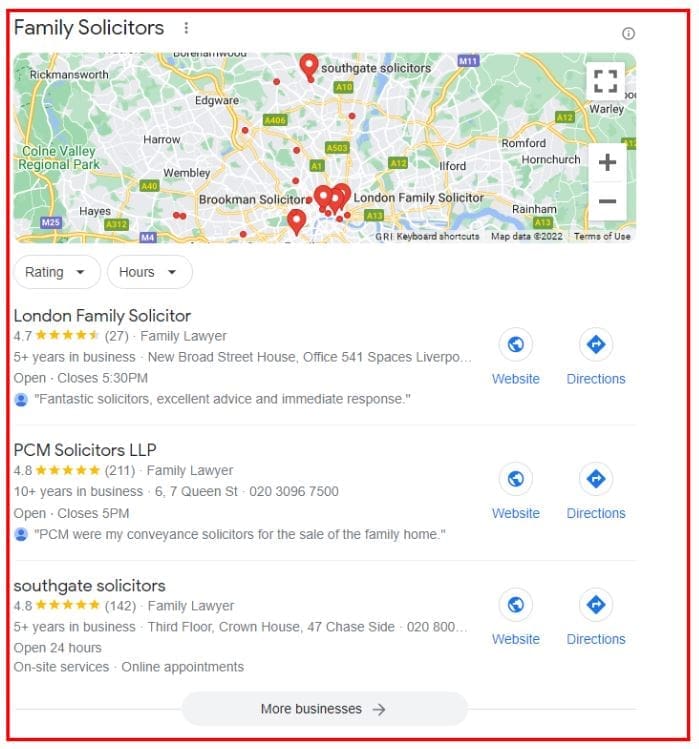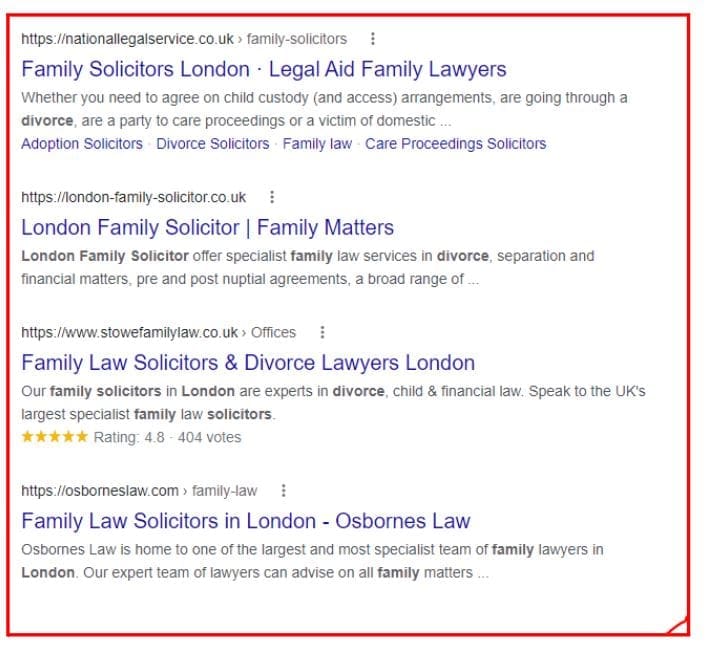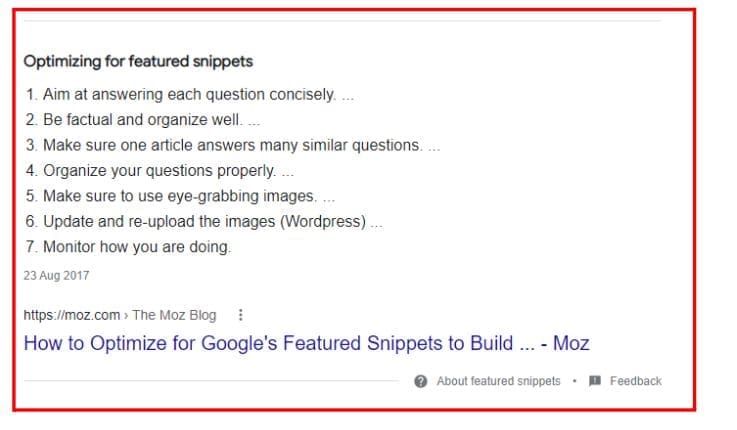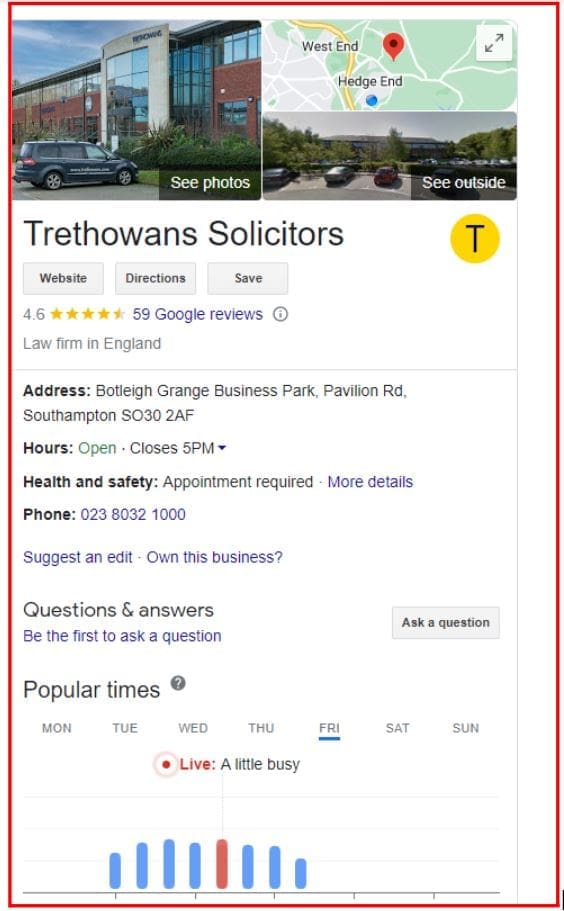Since Tim Berners-Lee invented the internet much has changed – most notably in terms of how businesses and organisations sell things. 90% of internet users search for products online – even when planning to buy them in-store. That’s why SEO keywords for law firms matter. In this digital age, knowing how to optimise online content to match user intent is essential if you want to stand toe-to-toe with your rivals.
If the mere mention of SEO for law firms makes your eyes glaze over, fear not. Things haven’t changed that much. Once upon a time consumers relied on a directory called the Yellow Pages which comprised hundreds of business listings arranged into categories.
Yellow Pages was discontinued in 2019 but the method by which we search has remained largely the same. We still use keywords to find businesses – albeit by typing words into a search engine rather than flicking through the index in a catalogue.
In this guide we’ll:
- Explain what the terms SEO and keywords mean
- Outline some tools you can use to find key terms
- Suggest keyword strategies to improve online rankings
- Show you how to incorporate keywords into your content
What is SEO?
Search Engine Optimisation (SEO) is a marketing technique used to improve the visibility of a website – so that it appears (ideally) in pole position on page one of Google.
The benefits of SEO
SEO keywords for law firms, if well-chosen, can:
- Improve the position of your website on Google, Bing, and other popular search engines
- Drive higher quantities of traffic your way – turning your site into a lead-generation tool
- If proper research is conducted first, improve the quality of visitors to your website too
Weaving specific terms into content won’t turn your website into a goldmine overnight. To rank for a specific keyword or phrase you’ll need to master a range of skills, tools, and techniques.
Even when SEO keywords for law firms are a strategic success you’re never number one for long – because rivals will copy and improve on your formulate to leapfrog to position one.
The types of SEO
The three types of SEO are:
- Technical – i.e. site speed, internal links, and backend development
- On-page – i.e blogs, videos, or e-books
- Off-page – i.e. external links, listings, or maps
What are keywords and why do they matter?
Keywords are terms people type into search engines to find things. Results are then arranged in order of relevance.
Web bots need keywords
No, this isn’t the name of a cartoon from the 1980s. Sites like Google deploy web bots to index and assess websites – so they know (a) what each site is about and (b) how important each of its pages are.
These ‘robots’ – which are just lines of codes – use data to rank websites in order of relevance. Ultimately this ensures only trusted content is presented to users, keeping them safe.
Less is best – don’t keyword stuff
SEO keywords for law firms – what’s the fuss all about? All you have to do is work out which terms prospects are using – then pepper content with as many of those terms as possible.
Unfortunately not…
Keyword stuffing is frowned upon by Google. Overpopulate your content with the same word or phrase too often and your site will be relegated to the outer fringes of cyberspace.
Keywords should:
- Be used only when necessary – so don’t force them into your content (which should still be readable)
- Comprise between 1-2% of your total content, including alt tags, meta titles, and domain name
Top tip: how to calculate keyword density (KWD)
- Press CTRL + F to search for your keyword
- Count how many times you’ve mentioned it
- Divide it by the number of words on the page
- Times that number by 100% to get your KWD
SEO keywords for law firms – understanding the anatomy of Google’s Search Engine Results Pages (SERPs)
Before beginning your research it’s important to understand how results are displayed in Google’s SERPs. The following examples are based on the search term ‘family law firms in London.’
Google Search Ads
Google Search Ads work on a Pay-Per-Click basis. Advertisers place bids – and, if successful, appear at the top of the page (provided no Local Service Ads are present).
Advertisers:
- Nominate the keyword they want to place for
- Pay each time a customer clicks on their ad
In other words, you are buying visits to your website. This method might be attractive to law firms that don’t have time to build an SEO strategy – or want to run targeted campaigns.
Local search results
The local search section comprises part of Google Maps and won’t cost your business a penny. However, achieving first place in these listings will be hard – due to intense competition.
To increase your chances:
- Complete all required fields – for example, company name, contact number, and website
- Ensure your company details are the same on all other directory and listing sites
- Respond to customer reviews – even the unfavourable ones
Organic search results
If you’ve created a page it will appear in the organic SEO section and underneath the local pack.
Your result will include:
- A meta title – which is the blue heading
- A description – which provides more detail
- In some cases, sublinks to other pages
SEO keywords for law firms can be costly if buying clicks. Organic content only costs as much time as it takes to create it.
People Also Ask
Questions relative to the enquiry will appear in the SERPs and in various sections of the page – (but most commonly below the organic results). Understand what customers are asking – and how to answer them expertly – and the People Also Ask tool could win you business.
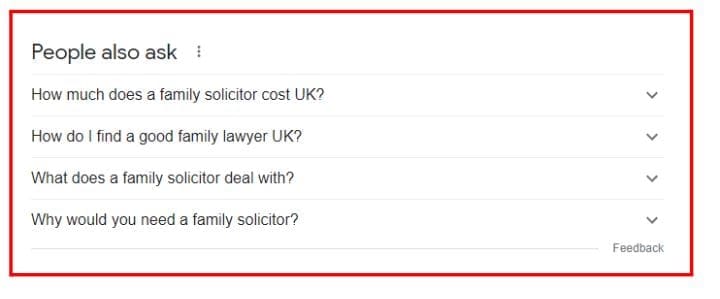 The featured snippet
The featured snippet
Also known as position 0, featured snippets display answers to user queries in a question and answer format. Should an SEO keyword for law firms strategy target featured snippets?
Absolutely it should – and to do so:
- Include your keyword or phrase in a question format
- Use that same term in your response early on
- Get to the point and stick to the facts only
In truth – whether writing a blog, web page, or e-book – you should always focus on answering a question well. So try and get into this habit rather than trying to achieve a position 0 for a specific word or phrase.
Local Panel
If you search for a business the Local Panel will appear and include its contact information, address, website, the type of service it offers and more. The Local Panel is included when you create a free Google My Business listing.
The top three keyword research tools for law firms
Finding the right phrases and terms to weave into your web copy should never be guesswork. That’s why SEO keywords for law firm strategies should follow a structured approach.
Of course, your research will only ever be as good as the tool you use.
With that in mind here are three well-known and trusted tools.
Google Keyword Planner
What is Google Keyword Planner?
Google Keyword Planner is a free online tool that helps businesses find relevant keywords and phrases for campaigns. In addition to suggesting keywords, the tool provides data to support strategic decision-making.
For example, Keyword Planner could tell you:
- How many people are searching for a term or phrase
- What the competition for that phrase is likely to be
- How much it would cost to run a corresponding ad
Whether you want to use organic search, PPC, or both, Google Keyword Planner is a great tool to start with.
What is Ahrefs?
With Ahrefs you can enter a term – or phrase – into its Keyword Explorer tool to reveal search volumes and a difficulty score that tells you the odds of ranking in the form of a numerical score.
Ahrefs:
- Scores keywords by difficulty – using a sliding scale of 1-100 using colour within a visual arc.
- Tells you the volume of searches for your keyword or phrase so you can understand how competitive it is
- Displays a Questions section where you can review keyword ideas for future content
Looking for SEO keywords for law firm ideas? Then Ahrefs might just be worth its price tag.
What is Ubersuggest?
Ubersuggest is 100% free and includes:
- An overview report that provides demographic information about searchers
- A dashboard where you can track competitor keywords
- An analytics tool that shows rivals’ traffic over time

Which is the best keyword research tool?
If you’re in the early stages of building an SEO keywords for law firms strategy, any of the above tools will help you identify the right terms.
Each one is easy to use too, even if you’re a beginner – meaning you can start with the basics before familiarising yourself with the more complex features.
There are other ways to find the right keywords too – some of which we’ve listed below.
Answer The Public
Enter your keyword and Answer The Public will compile questions asked by users from across the web. The tool then clusters the results around visualisation wheels that can be mined for content ideas.
Competitor websites
Type in a keyword then see which competitor pops up at the number one spot. Access their website and scan headings and body copy for terms and phrases you could add to your content.
Law firm web forums
Want to build a winning SEO keywords strategy? Law firms could do worse than scour web forums to see what questions prospects in their sector are asking – then convert them into questions using a tool like Answer The Public (or plain old Google).
Google Alerts
Keeping abreast of emerging trends will help your law firm develop a robust SEO keyword strategy that leads the curve. Enter your desired word or phrase into Google Alerts to receive mentions of it the moment it hits the web.
Where should you use keywords?
Add them to your:
- Primary and secondary headings (also referred to as H1s and H2s)
- Alt tags (text that sits invisibly behind an image on a website)
- Domain name – the text you type into a web browser to access a site
- Meta titles and descriptions, which appear in and below the blue link in organic results (as shown earlier)
What content can you add keywords to?
Researching SEO keywords? Law firms keen to rank highly in the SERPs can access a range of content options to outsmart rivals.
Here are just a few of them…
Web pages
Weave key terms and phrases into your pages to attract users looking for specific services you offer – then add them to headers, paragraphs, and other areas suggested in the previous section.
Blog posts
Blog posts needn’t be long and can focus on niche topics. For example, a family law firm might write about adoption or child custody law – a topic they might otherwise struggle to cover elsewhere on their website.
FAQ sections
Adding FAQs is a fast way to include questions harvested from keyword planning tools, forums, or People Also Ask. Again, this is a great opportunity to add niche keywords that might jar elsewhere.
Podcasts
Although podcasts are audio recordings, transcripts can be converted into text form rich with keywords and phrases. Why not copy that content into a blog post – as opposed to spending time writing something new.
Final considerations
SEO keyword research must be married to persuasive writing. Sewing together well-researched words and questions into a narrative won’t engage an audience. Instead, it’s more likely to drive them into the arms of your competitors.
User experience is also important – so:
- Create short, clear, and compelling CTAs to drive actions
- Keep language simple to avoid confusing prospects
- Keep paragraph blocks short – four lines maximum
- Use space to break up sections and aid readability
- Ensure your page is clear and uncluttered
Finally, don’t forget you’re telling a story. So create a strong hook to draw readers in and give your main character a challenge to overcome that’ll resonate with your audience.
If your firm specialises in family law incorporate your keyword research into a story about adoption – detailing the obstacles a family overcomes before taking custody of a child.
Conclusion
SEO keywords should form the foundation of any successful digital marketing strategy. But a deep understanding of your audience’s challenges must pre-empt the research and implementation process. There’s no place for educated guesses and hunches which will only lead your law firm down blind alleys.
Once you’ve assembled your keyword data decide where to use and it how. Again, this needs to be strategic.
If you’re focussing on family law:
- Will you generate leads through paid ads, organic content, or a mixture of both?
- What templates will you use for blog posts and pages to lever optimal responses?
- How will you use FAQs to effectively drive prospects to specific pages on your site?
It’s a lot to think about. Plus, you may not have the time (or expertise) to master SEO keywords. Law firms in this position often outsource to experts instead – and that’s where we come in.
SEO keywords for law firms needn’t be complex
At Boss Digital we know how to research and deploy the right keywords for legal firms. If you want to improve brand visibility, boost engagement, and increase ROI book your free call today.


